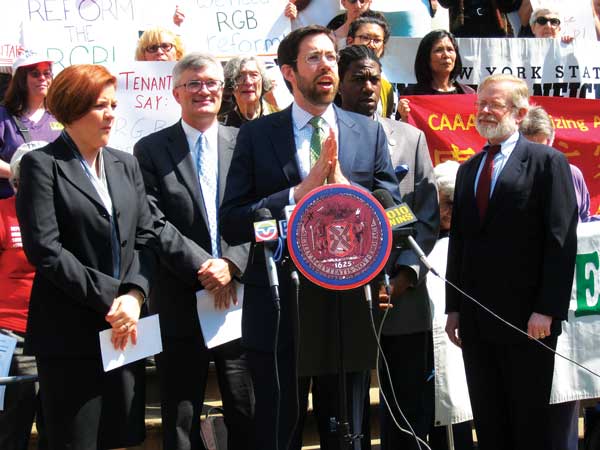 [/media-credit]
[/media-credit]
The prospect of a complete end to rent protections has tenants on edge and landlords salivating at the prospect of 1.1 million deregulated apartments. Meanwhile, tenant activists and their supporters in government are plowing ahead with a proposal to reform the city’s Rent Guidelines Board — but not in time to affect the setting of this year’s annual rent hikes. That process begins with a preliminary vote on May 1 at The Cooper Union. Last year, the board voted 3.75 percent increases on one-year leases and 7.25 percent for two-year leases.
All nine members of the R.G.B. are appointed by the mayor. The proposed state bill would not change that but would make the mayor get City Council approval for the appointees. And while the board would continue to have two tenant and two landlord representatives, under the proposed reforms, the five “public members” — who rarely speak at meetings and invariably do the bidding of the mayor — could be drawn from more diverse backgrounds than those who fulfill the current requirement of having five years experience in “finance, economics or housing.”
The bill, unveiled at a press conference on April 16 at City Hall, will likely be passed by the Democrat-led state Assembly, where Brian Kavanagh is the chief sponsor, but will be a tougher sell in the state Senate, which has a thin Republican majority. Daniel Squadron is the bill’s lead state Senate sponsor. Governor Andrew Cuomo has not weighed in on the proposal.
Squadron said the fate of 2 million tenants was “too important to leave in one person,” the mayor. Kavanagh said the rent board’s members should be allowed to include people with experience in “social services, social sciences and philanthropy.”
Council Speaker Christine Quinn called the current R.G.B. “a kangaroo court.”
“The rents go up every year regardless of the data,” she said. The data can allow the board to lower or freeze rents, but that’s something that has never happened.
Attorney Adriene Holder, a longtime tenant member of the board, called for “accountability.”
“A majority of rent-stabilized tenants are not able to afford their apartments based on the HUD benchmark for housing affordability,” she said, referring to the federal department of Housing and Urban Development.
Maggie Russell-Ciardi, executive director of Tenants & Neighbors, complained that public members of the board vote down tenant proposals “without discussion. We want them engaged in the issues,” she said.
Sponsors of the bill are not pushing for the City Council to be able to make their own appointments to the board. Speaker Quinn demurred on the question of Council appointees.
“It’s a state bill,” she said, “but I’ve never said no to power.”
Councilmember Jumaane Williams, a former director of Tenants & Neighbors, promised a lively tenant presence at the guidelines board hearings and meetings over the next two months.
“We’re going to go down with Occupy people and shout them down again” until the board becomes more responsive to tenants, Williams said.
































